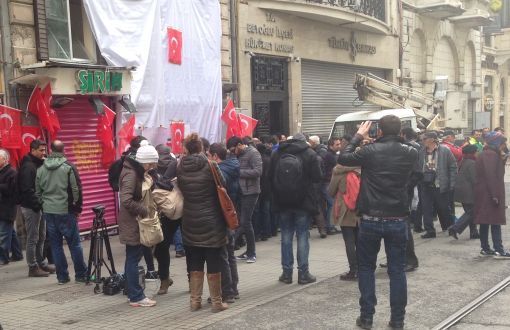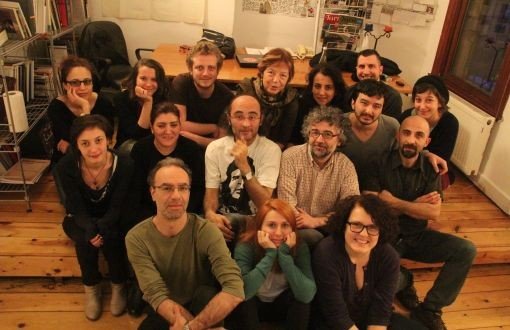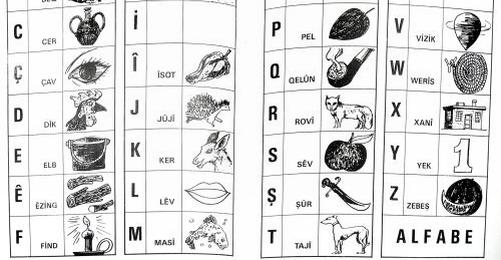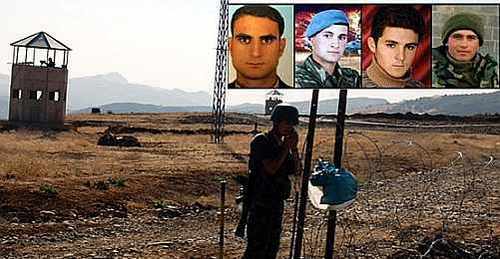Turkey's three bar associations in Ankara, Istanbul and Izmir, intervened in the strife this month with a proposal they believed would be acceptable to both the inmates and the Justice Ministry:
According to the ''Three Doors Unlocked'' scheme, the inmates who would stay in the their solitary confinement cells during nights, would be allowed to come together in groups of nine during the day time to return to their cells after sunset.
This, the bar associations officials believe, will respond to both the ministry's concerns for keeping tight control on the inmates and the prisoners' worries of personal security and of being isolated from their social ties.
However, in a press briefing this week Justice Minister Hikmet Sami Turk and ministry officials said they found the proposal inapplicable and inadmissible. But, they would consider allowing the prisoners to come together for total 5 hours in a week in groups of 10, if they agreed to end the hunger strike.
The turbulent prison strife was triggered in late 2000 when the Ministry of Justice unveiled a plan to transfer political prisoners to maximum-security prisons dubbed as ''F-Types''.
Deeply worried that the government's plan to isolate the prisoners would present a serious threat to their personal security a group of 800prisoners, belonging to the clandestine left wing groups DHKP-C(Revolutionary People's Liberation Party-Front), TKP/M-L (Turkish Communist Party/Marxist-Leninist), and TKIP (Turkish Communist Workers Party), began their hunger strike on Oct. 29, 2000 in order to stop the transfers.
In spite of mediation efforts by non governmental organizations (NGOs)and intellectuals - such as novelists Yasar Kemal and Orhan Pamuk and composer Zulfu Livaneli - Justice Ministry officials walked out of negotiations aimed at bringing an end to the strike on its 61st day.
On Dec, 19 2000, police troops stormed 48 prisons across Turkey and forcibly transferred 1,005 political prisoners to F-Type prisons that were still under construction. Lasting a week, the operation code named ''Return to Life'', left 31 prisoners and two security force members dead and 426inmates injured.
The operation, which was aimed at ending the strike, instead triggered further resistance as 1,200 more prisoners joined the protest.
Since Oct. 2000 45 inmates, and their relatives from outside the prison who joined the strike in support, have died.
. Gulay Gokturk, columnist with the daily newspaper Sabah, who attended both the bar associations' and the ministry's briefings, has described the ministry's resistance as ''unreasonable''.
''The minister and his aides claim that if the inmates are brought together in groups of nine during the day time this would completely undermine the security in the maximum security prisons,'' Gokturk says.
''How serious could such claims be? What harm could nine unarmed and isolated inmates inflict on prison security if they would come together in a prison corridor which is uninterruptedly monitored by cameras and controlled by prison guards? What we really need is determination to solve the conflict,'' concludes Gokturk.
The latest inmate to die in the protests was Lale Colak a 27-year-oldleft-wing activist from Sivas province who was charged with affiliation with the clandestine group TIKB (Turkish Revolutionary Communists Union). In prison since 1996 she was one of the inmates transferred from Istanbul's Umraniye Prison to Kartal maximum-security prison. Taken to Bayrampasa Hospital when her health worsened in the 222nd day of hunger strike she was released from prison on Dec 21. 2000.
Although she had regained her consciousness during treatment she could notrecover from the physical breakdown and died on Jan 8.
Despite refusing to concede to the prisoners' demands the Ministry of Justice has, however, adopted a controversial practice with the aim of reducing the number of deaths in prisons.
Relying on an exceptional clause of the ''Law of Execution'' the Justice Ministry has suspended the terms of strikers who have come to the brink of death on ''concerns of health'' and released the inmates, some of who continue strike in their homes or hospitals after their release.
On the other hand Turkish president Ahmet Necdet Sezer, relying on his constitutional powers, have pardoned seven strikers who have personally pleaded for their release due to health conditions.
Under these conditions 350 hunger strikers from across the country's maximum security prisons have been released since May 2001, seven of who have lost their lives as they continued with the strike outside.
How will this human tragedy will be brought to an end, no one seems to have a clear answer.
''Mutual obstinacy continues since one and a half year,'' says Umit Efe, chair of the Prisons Desk of Human Rights Association's (IHD) Istanbul Branch. ''The government should have accepted the proposal offered by the bar associations,'' she told IPS.
''According to standards set by International Union of Physicians, confinement of people in groups smaller than 15 is seen as isolation. Therefore even the 'Three Doors Unlocked' proposal was substandard in these terms. Yet that could very well provide the basis for a midway solution,"she said.
''The prisoners, as a matter of fact, have started to give signs of concession. Support strikes from without the prisons have been halted and no new groups are entering in the strike within the prisons,'' she said.
However, Efe is pessimistic that the strikers will retreat more than that and it falls on the Justice Ministry's shoulders to forge out a ''humane'' solution to the strife. Or, she says: ''This tragedy might continue infinitely, and no one deserves this.''










